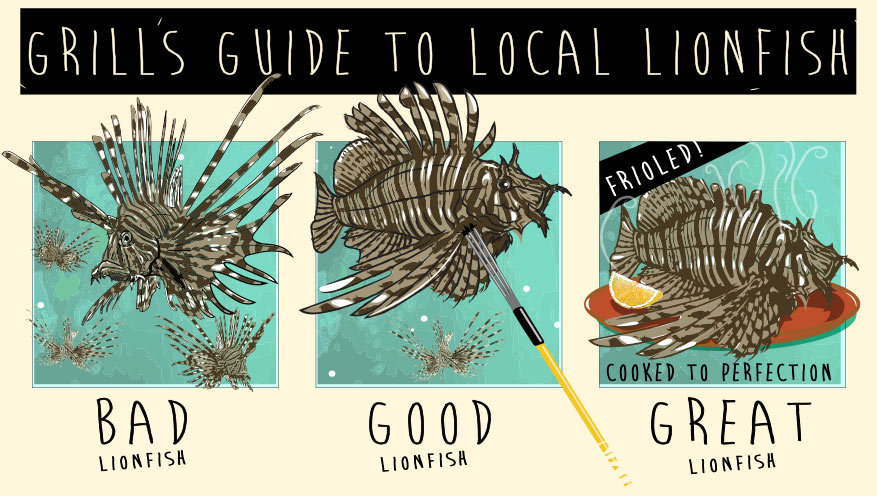Monday, July 16, 2018 11:24:40 AM
Can Florida’s Lionfish Challenge rein in the venomous invasive? Maybe.

Michael DeRemer, a prize-winner of the state's Lionfish Challenge, removes lionfish from a cooler for a fish fry at Jim's Dive Shop in St. Petersburg on July 13. DeRemer caught three lionfish tagged by the state. MARTHA ASENCIO RHINE | Times
By Justin Trombly
July 16, 2018 at 05:52 AM
Submerged in the Gulf of Mexico, Michael DeRemer spotted the yellow glint of the lionfish’s tag.
The 62-year-old Largo diver had been looking for grouper that June day, but the tag changed things: It meant the spiny seafarer was a lucrative target — one that would yield prizes as part of this year’s state Fish and Wildlife Conservation Commission Lionfish Challenge, the third since 2016.
So, he aimed his pole spear.
That specimen and two more DeRemer nabbed later won him $500, a GoPro camera and a shirt. Those are the kinds of incentives Florida is offering people to catch lionfish, a venomous Indo-Pacific native that has infested Florida’s coastal waters.
And though eradicating the species no longer seems like an option, the state’s initiative — which began in May and lasts until Labor Day — could help curb the invasive population where it may be most noticeable: local reefs.
"It’s really more like weeding the garden," said Stephanie Green, a marine ecologist at the University of Alberta who studies the species.
• • •
Green’s analogy was echoed by others researchers: If you want the notoriously gluttonous lionfish to stop eating everything at the reef nearby, you have to cull them regularly.
That’s why the Lionfish Challenge is an improvement to Matthew Johnston, a biology professor at Nova Southeastern University in Fort Lauderdale.
For years, sporadic tournaments have been organized across the state to hunt lionfish, likely doing little in the long term to combat the species. "Consistent, monthly, concerted effort throughout the entire area" is how to best control the populations, Johnston said.
Johnston and other experts — though not opposed to the contest — also expressed skepticism or uncertainty about just how much the state’s effort can address the issue on a wider scale.
"We shouldn’t be lulled into thinking that this will solve the problem," he said.
• • •
The task isn’t hard just because there are so many lionfish.
Lionfish live as far as 1,000 feet below the surface, and divers can descend only between 100 and 120 feet before risks arise. That means most divers target lionfish in relatively shallow water, on reefs. But those killed by divers can be replaced within months, either by adults that have migrated from nearby, seizing the vacuum, or by larvae that have floated in on ocean currents.
"(Lionfish) have this deep-water refuge where they can go down and spawn," said LeRoy Creswell, who works for the University of Florida-operated Florida Sea Grant, the regional leg of a national research program.
"You always have this source of new recruits coming up to the surface," he said. "You can have all the derbies and challenges and awards … but it’s just the tip of the iceberg."
• • •
The Lionfish Challenge works like this:
Any participant who submits 25 lionfish (the recreational category) or 25 pounds of the species (the commercial category) receives a shirt; a commemorative coin that allows the harvest of one extra spiny lobster per person per day during the July 25-26 season; and an entry in the conservation commission’s "Lionfish Hall of Fame."
Prizes get glitzier the more fish you bag. Turning in 400 lionfish wins you a customized ZooKeeper, a device well-known to anglers that’s designed hold 14 to 20 pounds of lionfish and protect from their venomous spines.
Along with raffles and trophies for the largest hauls, participants can win cash and other prizes for catching tagged lionfish, like DeRemer did.
The tagged fish — caught, labeled and released in public waters by the state beforehand — are new this year. The hope is that they act like Willy Wonka’s golden tickets, pushing more people to seek out the species. Lionfish aren’t normally desirable; their spines sting, making them a pain to clean and fillet. Only recently have they wound up on restaurant menus.

The number of participants and the number of harvested lionfish have increased since the effort began, conservation commission spokeswoman Hanna Tillotson said.
In 2016, 95 participants caught 16,609 lionfish; in 2017, 120 caught 26,454. As of July 10, 82 people had participated in this year’s iteration, catching 8,510 fish. The final totals are expected to overtake those of the first two years.
• • •
For his part, DeRemer was certain of one thing: "Those little guys are good to eat."

Outside Jim’s Dive Shop in St. Petersburg on a recent Friday, he was plucking strips of lionfish from a cooler, rolling them in a mound of seasoning and dropping them into a makeshift fryer for hungry guests inside.
He turned to check on his grub, revealing the back of the shirt he had won from the state: an illustration of a lionfish, its long spines fanning out over its body, red and white and deadly. The strips sizzled, and DeRemer scooped them into a tray. Golden brown.

http://www.tampabay.com/news/environment/wildlife/Can-Florida-s-Lionfish-Challenge-rein-in-the-venomous-invasive-Maybe-_169764438
Join the InvestorsHub Community
Register for free to join our community of investors and share your ideas. You will also get access to streaming quotes, interactive charts, trades, portfolio, live options flow and more tools.







